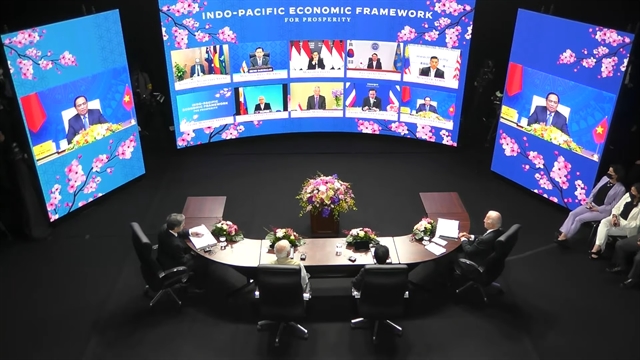Viet Nam joins Indo-Pacific Economic Framework for Prosperity
Viet Nam will join 12 countries in the region in the Indo-Pacific Economic Framework for Prosperity (IPEF) as US President Joe Biden launches the initiative on Monday during his visit to long-term ally Japan.
 |
| Vietnamese Prime Minister Pham Minh Chinh gave the speech at the launch of the Indo-Pacific Economic Framework for Prosperity on Monday. — VNS Photo |
The formal rollout of the IPEF was held in a hybrid format in Tokyo – with US President, Japanese Prime Minister Fumio Kishida, and Indian Prime Minister Narendra Modi taking part in person, and leaders from Australia, Brunei, Indonesia, Malaysia, New Zealand, Philippines, Singapore, South Korea, Thailand, and Viet Nam joining remotely.
The White House said this economic framework with an initial 13 countries represents 40 per cent of global GDP.
The framework will focus on four key pillars – Connected Economy (including rules on digital economy, standards on cross-border data flows and data localisation, online privacy, and use of artificial intelligence); Resilient Economy (first-of-their-kind supply chain commitments that better anticipate and prevent disruptions); Clean Economy (commitments on clean energy and decarbonisation, infrastructure that promote good-paying jobs); and Fair Economy (effective tax, anti-money laundering, anti-bribery regimes, etc.)
Addressing the launch from Ha Noi, Vietnamese Prime Minister Pham Minh Chinh said the current landscape calls for the adjustments of our growth model and economic linkages towards greater sustainability and resilience in order to fully harness the internal power and optimise external resources minding that internal resources are fundamental, strategic, long-term determinants while external resources are a constant game changer.
“Multilateralism and international solidarity must be grounded in security, trust, responsibility,” he noted.
“Today’s launch of the Indo-Pacific economic framework will kickstart a serious discussion in exchange of ideas towards addressing critical regional and global issues together, issues that no one can address on their own like ones on a global scope – supply chains diversification and resilience, technological innovation, digital transformation, e-commerce promotion, climate change response, achieving net-zero by 2050, green growth, taxation issues and anti-corruption among many others,” the Vietnamese Government leader said.
"Viet Nam is committed to pursuing and is making all efforts towards an independent, self-reliant economy hand-in-hand with extensive and substantive international integration," PM Chinh underlined.
"Viet Nam is also participating in various initiatives at international connectivity, and is an active contributor to the joint efforts to accelerate economic recovery and sustainable development in the region and the world."
With regards to the IPEF, PM Chinh expects that the discussions and brainstorming will bring about a cooperation framework “that is truly beneficial to all people,” as after all, “people are the centre, the object, the purpose, and the driver for development in all types of international integration processes today.”
It should be an inclusive, open, and flexible process, balanced and pursuant to international laws, and serves the lawful and legitimate interests of all parties concerned, PM Chinh said.
"IPEF will be best harnessed when it complements the existing economic connectivity initiatives," he added.
Viet Nam pledged to work with ASEAN members and US partners in the discussions to clarify what the IPEF cooperation pillars entail and bring about an economic agenda that is conducive for the region and for each country, for peace, stability, cooperation, and development in the region and the world and prosperity for all.
For Viet Nam, Australia, and New Zealand, the IPEF will be their third major trade pacts aside from the Comprehensive and Progressive Agreement for Trans-Pacific Partnership (CPTPP) and the Regional Comprehensive Economic Partnership (RCEP).
Source: VNS